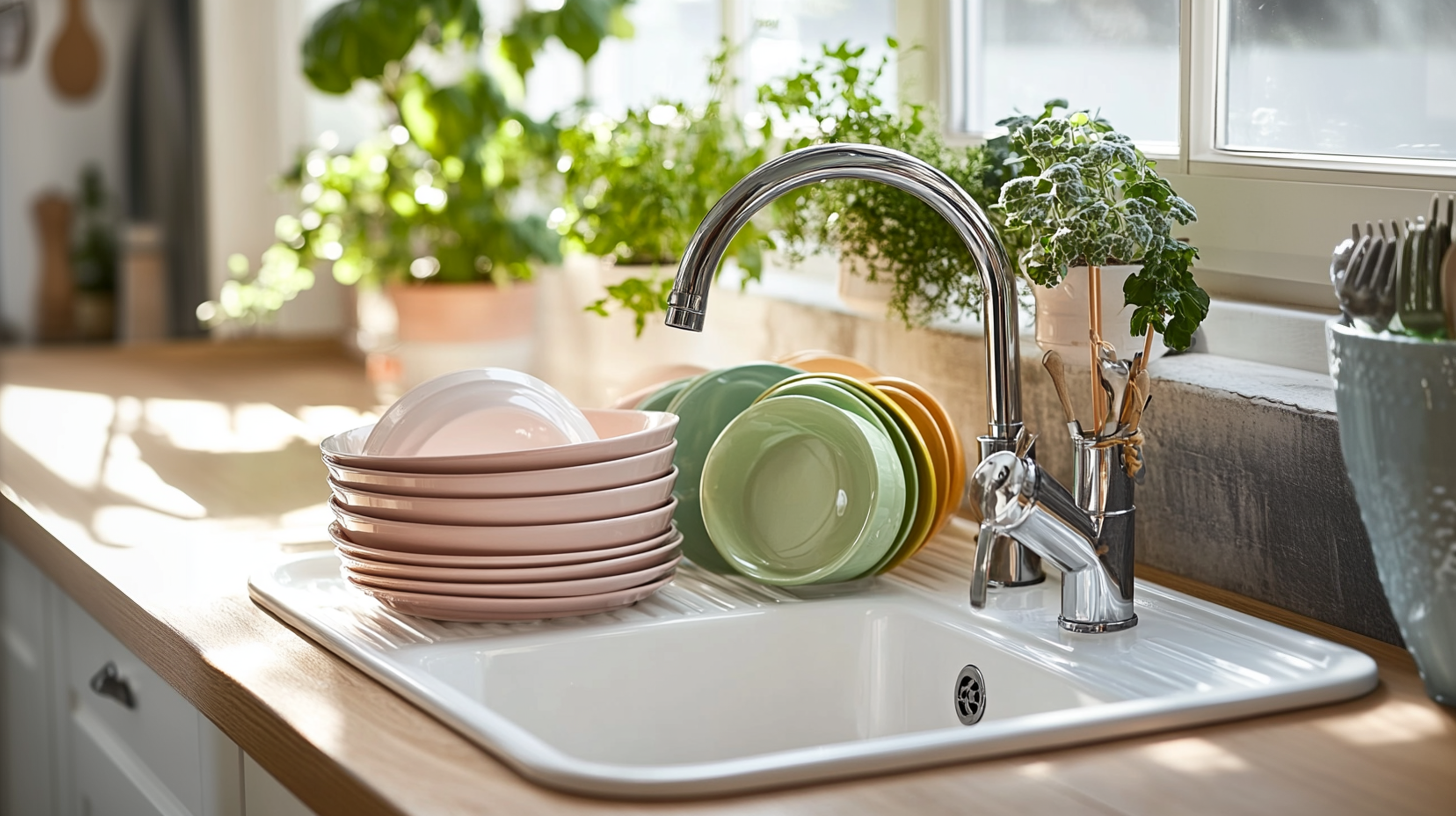In today’s eco-conscious world, every small effort counts, including how we wash our dishes. Adopting sustainable practices in the kitchen can help reduce water waste, lower energy consumption, and minimize the use of harmful chemicals. In this blog post, we’ll share practical tips for washing dishes in an environmentally friendly way, helping you keep your kitchen clean while doing your part for the planet.
1. Choose an Eco-Friendly Dishwashing Liquid
The first step to sustainable dishwashing is using an eco-friendly dishwashing liquid. Many conventional dish soaps contain harsh chemicals, synthetic fragrances, and non-biodegradable ingredients that can harm the environment when they wash down the drain. Switching to a natural, biodegradable formula like Purnest Dish Wash ensures your dishes are cleaned effectively while protecting aquatic ecosystems from harmful chemicals.
Purnest Dish Wash is made with 100% natural ingredients, free from synthetic fragrances and harsh chemicals, and packaged in eco-friendly, biodegradable bottles. It’s gentle on your hands but tough on grease, making it the perfect choice for an eco-friendly dishwashing routine.
2. Use Cold Water for Rinsing
While hot water is typically needed for cutting through grease and sanitizing dishes, you can use cold water for rinsing to save energy. Rinsing your dishes with cold water after scrubbing can significantly reduce your household’s energy consumption, especially if you’re doing multiple loads of dishes every day.
Tip: Make sure the water isn’t running continuously while you rinse. Instead, fill a second basin or the other side of your sink with cold water and use that for rinsing.
3. Scrape, Don’t Rinse Before Loading the Dishwasher
If you’re using a dishwasher, avoid rinsing your dishes before loading them. Modern dishwashers are designed to handle dirty dishes without the need for pre-rinsing, which can save up to 20 gallons of water per load. Instead, scrape any excess food into the compost bin and let your dishwasher do the rest.

4. Opt for Energy-Efficient Dishwashing
If you have a dishwasher, use it wisely to minimize your energy and water consumption. Here are a few sustainable dishwashing tips:
- Only run the dishwasher when it’s full – This helps maximize the efficiency of each load, reducing the number of washes needed.
- Use the eco mode – Many modern dishwashers have an energy-saving or eco mode, which uses less water and energy during the wash cycle.
- Skip the heated drying – Allow your dishes to air dry by selecting the air-dry option or simply opening the door after the cycle is complete.
Using an energy-efficient dishwasher can save both water and energy, making it a more sustainable option compared to hand washing, especially when you only run full loads.
5. Hand-Wash Dishes the Eco-Friendly Way
When it comes to hand-washing dishes, you can still do it in a way that minimizes water waste and environmental impact. Here’s how to wash dishes by hand sustainably:
Steps for Eco-Friendly Hand Washing:
Fill the sink with water – Instead of washing dishes under a running tap, fill the sink or a basin with warm, soapy water using an eco-friendly dishwashing liquid like Purnest Dish Wash.
Wash the least dirty dishes first – Start with glassware and lightly soiled dishes, then move on to the greasier pots and pans. This way, you can use the same water for all the dishes without having to change it.
Rinse efficiently – After scrubbing, use a bowl or container to rinse dishes using minimal water, or turn the tap on only as needed.
By filling the sink and using only what’s necessary, you can save up to 50% more water compared to washing under a continuous stream.
6. Reduce Single-Use Sponges and Towels
Many people use disposable sponges and paper towels when washing dishes, which contributes to unnecessary waste. Instead, opt for reusable alternatives like:
- Compostable sponges: These are made from natural fibers and can be composted after use, reducing landfill waste.
- Microfiber cloths: These are durable, machine-washable, and can be reused many times, making them a more sustainable choice.
- Reusable dish brushes: With natural bristles and wooden handles, these brushes can be used for years and are more durable than plastic options.
7. Compost Food Scraps, Don’t Rinse Them Away
When scraping food off your dishes, avoid rinsing it down the drain. Instead, compost food scraps to reduce waste and prevent blockages in your plumbing. Composting organic waste helps reduce methane emissions from landfills and returns valuable nutrients back to the soil.
8. Use Refillable Containers for Dish Soap
At Purnest, we encourage sustainable consumption with our refillable dish soap containers. Instead of buying a new plastic bottle every time you run out of dish soap, purchase our 3-liter or 5-liter refill containers to top up your existing bottle. This not only helps you reduce plastic waste but also saves money in the long run.
Conclusion: Clean Dishes, Cleaner Planet
Washing dishes is something we do every day, but with a few simple changes, you can make it a more sustainable and eco-friendly task. By choosing natural products like Purnest Dish Wash, minimizing water use, and opting for energy-efficient methods, you’ll be contributing to a healthier planet with every dish you clean.
Make the switch to eco-friendly dishwashing today and enjoy sparkling clean dishes without harming the environment!





